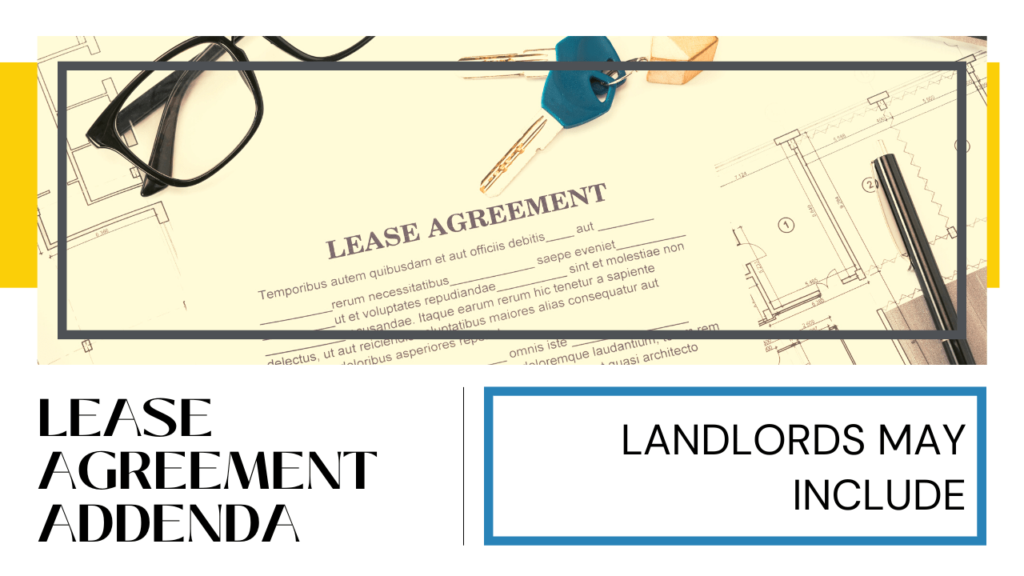
The lease agreement you and your tenants sign is likely your strongest protection against any conflicts, problems, or issues that may arise during a tenancy. What you need to remember, however, is that lease agreements aren’t a one-size-fits-all solution. They likely won’t remain relevant for years and years. Over time, you’ll need to adjust, refine or add to your lease to mitigate any problems that may arise.
This is why a lease addendum is also necessary. Lease addenda will keep your leases efficient, objective, and compliant with changing law.
A property management company based in Harker Heights, Shine Residential Management cares for exceptional single-family homes throughout Central Texas, including in Killeen, Temple, Belton, Copperas Cove, Salado, and Georgetown. In our years of experience in the property management industry, we have learned a thing or two about addenda.
Lease addenda are separate documents that Killeen landlords may add to an original lease agreement. You can use them to provide additional information that the original lease doesn’t cover. The addenda that are included in your lease will address specific needs and issues that may only apply to your rental property. They might include special disclosures as well.
The addenda you’re including are not the same as lease amendments, which are changes made directly to the existing lease itself. While they serve a similar purpose, amendments are often used mistakenly to mean the same thing as addenda.
Some addenda in Texas are legally required. The Lead Paint Disclosure rule is a good example of that. Most addenda, however, are created from experience and need.
Here’s what your addenda may include.
Killeen Rental Properties and Pet Addenda
Are you offering a pet-friendly property? That’s excellent news. It means you’re likely to reduce vacancy time, earn more money on your rental property, and attract great tenants who are likely to care about and take care of their pets and your property.
The decision to allow pets isn’t always easy. To protect your property, you want to be sure there’s a strong pet policy in place. You can include that pet policy in your lease agreement as an addenda. Here, you’ll have the opportunity to be very specific. You can stipulate:
- The types or breeds of pets you allow
- Fees and/or deposits and pet rent that may be due per pet
- Limits on size and number of pets
- Requirements for a pet screening
If you don’t allow pets at all, you may want to include something in the lease agreement about pets not being permitted under any circumstances. But if you are allowing pets, or you’re willing to consider pets on a case-by-case basis, make sure you have a strong pet agreement in place that protects your property.
Something important to keep in mind when we’re talking about animals: service animals and support animals or companion animals are not considered pets. You cannot refuse a tenant who is moving in with a service dog. The law sees them as accommodations, not pets.
Including a Smoking Addendum
Smoking is something that can potentially damage your property. It’s expensive to clean up the remains of a tenant who habitually smoked in your property.
Today, tenants may be smoking cigarettes, cigars, pipes, vapes, and even medical marijuana that’s prescribed through the Compassionate Use Policy in Texas.
To protect your property and keep your homes smoke-free, always state that smoking is prohibited in the lease. Then, you can enforce a smoke-free environment in your property. If you don’t clearly mention the cleaning fees and other consequences for which a tenant will be responsible, you’ll want to put them in an addendum. Create a separate policy that addresses smoking and tells your tenants what you’ll do in terms of enforcing a smoke-free rental home. You might provide them the option to smoke outdoors, for example, but not inside.
Addenda Addressing Guests and Visitors
Your tenants are likely to have guests and visitors in your property. These friends and family members of your tenants have not been screened and are not responsible to the lease agreement. But, you can hold your tenants accountable to following the lease agreement rules and requirements that address guests.
Many landlords in Killeen will limit the number of people who can be in the property at any time. This will protect your property and limit the amount of wear and tear and deterioration that accumulates during the tenancy.
Put together a policy that addresses long-term guests. Set a limit for how long they can stay. It might be a week or two weeks. For any period of time that’s beyond that, you can require that they be screened and added to the lease agreement via an addendum.
Custom and Additional Addenda for Killeen Rental Homes
Lease agreements should be consistent, but you also have to acknowledge that every property is different. You might have, in your rental property portfolio, one single-family home that includes a pool, for example. Not every lease agreement you produce necessarily has to address pools. But, the lease that goes with that particular home will need some language around pool safety and cleaning requirements.
Your addenda should reflect tenant responsibilities, any new or existing laws, and the specifics that are needed for one property in particular. Some of the language in our lease addenda address the following:
- Pools and spas. If you’re renting out a home that has a pool or a hot tub, you’ll need some specifics in an addenda. Include the safety requirements, such as a working and latched fence as well as cleaning and maintenance stipulations. You likely won’t want your tenants mixing pool chemicals, so your pool addendum might reflect that a professional pool company will visit every week or every month at the expense of the tenant or the owner. Check with your insurance company about any specific language that you’ll need to include around liability and safety.
- Fireplace addendum. If you’re renting out a home with a fireplace, you’ll need an addendum that addresses safety and maintenance requirements. Again – talk with your insurance agent so you can be sure everything is covered.
- Mold addendum. You’ll want something in writing that reflects the responsibility of tenants and owners when it comes to identifying, cleaning, and preventing mold and mildew.
- Bed bug addendum. As an owner, you should pledge to provide a home that’s free of infestations, including bed bugs. Sometimes, tenants moving into a home bring bed bugs with them. Your addenda will need to talk about identifying bed bugs and minimizing the risk of infestation.
Legally Required Lease Disclosure in Texas
The lead-based paint disclosure is required for all lease agreements, per the Department of Housing and Urban Development (HUD) and the Environmental Protection Agency (EPA). You likely have a section of your lease that addresses lead based paint, but if you don’t have that written in there, make sure you include an addendum.
There’s also a fairly new addendum that’s legally required. The Texas State Legislature passed a law requiring landlords to give notice to prospective residential tenants if the landlords are aware that the rental dwelling is located in a 100-year floodplain or whether the rental dwelling has flooded during the past five years.
A mandatory addenda must be included beginning January 1, 2022. You’ll want to make sure you have this available with your leases. If your property is not in a 100-year floodplain and it has not flooded in the last five years, you still need to provide this addendum. You should simply indicate in the addendum that you are not aware that your property is located in a floodplain and you are not aware that it has flooded at any time in the last five years.
How to Execute Lease Addenda in Killeen
Like your lease agreement, any addenda must include the basic elements of what you and your tenants are agreeing to by executing the lease.
Any addenda must include the date, the address of the rental property, and the names of each party – just like with your original lease. Assign a title to each addendum you create and include with the lease. These addenda will carry just as much validity and legal weight as the language in the original lease agreement. You can ask your tenants to sign that they have received and understood the addenda you provided.
Addenda usually address issues unique to your specific property, so it might make the most sense to create your own. If you choose to research templates online, make sure that they’re professional and that they cover everything you want to include. Of course, running any changes or additions past a lawyer is never a bad idea. You want to make sure the addenda you use are legal in the state of Texas.
Putting together a lease can be challenging. You’re trying to follow the Texas Property Code as well as all the local, state, and federal laws that pertain to rental property. Then, there are all the addenda that need to be included in case something was missed in the original lease agreement.
 It does not have to be stressful. In fact, if you contact us at Shine Residential Management, we’d be happy to help you have an easy leasing experience. We have templates and attorney-reviewed lease agreements and a list of addenda that we know we’ll need. Let’s talk about how to manage this part of the process.
It does not have to be stressful. In fact, if you contact us at Shine Residential Management, we’d be happy to help you have an easy leasing experience. We have templates and attorney-reviewed lease agreements and a list of addenda that we know we’ll need. Let’s talk about how to manage this part of the process.
